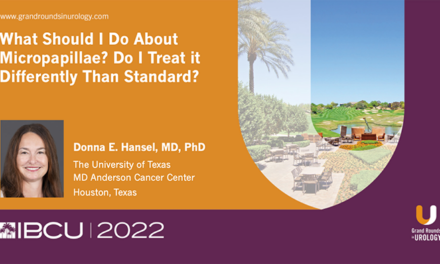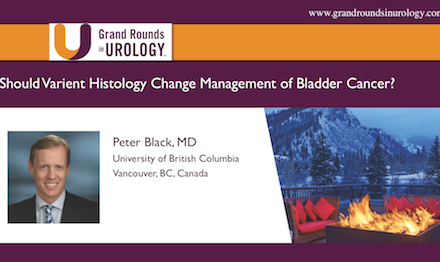Guru P. Sonpavde, MD, presented “Earlier Use of These Treatments Moving Into Adjuvant and NMIBC: What Do We Do About Patients for Reinduction of Immune Treatment” at the 6th International Bladder Cancer Update on November 18, 2022, in Scottsdale, Arizona.
How to cite: Sonpavde, Guru P. “Earlier Use of These Treatments Moving Into Adjuvant and NMIBC: What Do We Do About Patients for Reinduction of Immune Treatment” November 2022. Accessed Aug 2025. https://grandroundsinurology.com/earlier-use-of-these-treatments-moving-into-adjuvant-and-nmibc-what-do-we-do-about-patients-for-reinduction-of-immune-treatment/
Earlier Use of These Treatments Moving Into Adjuvant and NMIBC: What Do We Do About Patients for Reinduction of Immune Treatment – Summary
Guru P. Sonpavde, MD, Genitourinary (GU) Oncology Director, Assistant Director of the Clinical Research Unit, and Christopher K. Glanz Chair for Bladder Cancer Research at the AdventHealth Cancer Institute in Orlando, Florida discusses patients previously treated with immune-checkpoint inhibitors (ICI) in the adjuvant space for non-muscle-invasive bladder cancer (NMIBC). Dr. Sonpavde reviews current therapies for metastatic bladder cancer and points out that multiple neoadjuvant phase-three trials are paving the way for earlier use of ICI for patients with muscle-invasive bladder cancer. He outlines causes of ICI interruption and types of re-treatment with the same or a different ICI agent. He cites a Medicare claims database analysis that showed patients who discontinued ICI rarely returned to it. Around three percent received a different PD-1/L1 inhibitor after discontinuing a PD-1/L1 inhibitor. Over half received no further systemic treatment. He cites a recent study on treatment rechallenge with ICI that concludes some patients with urothelial carcinoma (UC) benefit from reintroduction of a second ICI-based regimen and larger studies are needed. Dr. Sonpavde cites research on other cancers and a systematic review and meta-analysis that indicate rechallenge ICI may be an active and feasible strategy. He outlines uncertainties surrounding the efficacy of ICI rechallenge for UC and enumerates his conclusions, recommending the use of good clinical practice in the absence of high-level evidence for ICI monotherapy rechallenge. Further, Dr. Sonpavde emphasizes activity from ICI rechallenge can be seen especially if there was a prior response and longer treatment-free interval, pointing out intervening therapy after progression on initial ICI may reprogram the tumors and render them sensitive to retreatment. Dr. Sonpavde concludes with the necessity of prospective data and points to phase-two trials that will evaluate the reinstitution of PD1/L1 inhibition in combination with another agent in metastatic UC.
About the 6th International Bladder Cancer Update:
The International Bladder Cancer Update (IBCU) is a CME conference focused on the diagnosis and treatment of bladder cancer. The conference offers medical professionals an opportunity to listen to updates from, and interact with, expert international faculty to improve knowledge and determine best treatment practices to improve patient outcomes. IBCU encompasses expert lectures, interactive discussions, a panel roundtable, debates, and case presentations. It is physician-led, multi-supported, and designed for urologists, urologic oncologists, and other healthcare professionals involved in the treatment of bladder cancer.
For further educational activities from this conference, visit our collection page.
ABOUT THE AUTHOR
Guru P. Sonpavde, MD, is the Director of Genitourinary (GU) Oncology and Phase I Research as well as the Christopher K. Glanz Chair for Bladder Cancer Research at the AdventHealth Cancer Institute in Orlando, Florida. Additionally, he holds a position of Professor of Medicine at the University of Central Florida. Previously, Dr. Sonpavde was Bladder Cancer Director at the Dana-Farber Cancer Institute and Associate Professor of Medicine at Harvard Medical School from 2017 to 2022. He was also GU Oncology Director and Associate Professor of Medicine at the University of Alabama at Birmingham from 2012 to 2017, and he practiced from 2004 to 2012 at Texas Oncology, a US Oncology affiliate.
Dr. Sonpavde completed his medical oncology and hematology fellowship at Indiana University. His focus is drug development (including early-development Phase I clinical trials and later Phase II/III trials) evaluating immunotherapy, targeted therapy, antibody-drug conjugates, and other novel and emerging classes of treatments (e.g., Bi-Specific T-cell engagers, CAR T-cells) across solid tumors and clinical/translational research to cure GU cancers with a focus on bladder cancer. He serves on the steering committees of several pivotal phase III trials evaluating treatments for bladder cancer. Under his leadership, the Phase I and GU Oncology program have grown robustly at the AdventHealth Cancer Institute. His research efforts have led to around 500 publications.
He also enjoys interacting with medical residents and fellows in order to teach and mentor research projects leading to presentations and publications. He is a member of Southwest Oncology Group, the Scientific Advisory Board of the Bladder Cancer Advocacy Network (BCAN), and the Bladder Cancer Task Force of U.S. NCI GU Steering Committee. He has often contributed to or has been cited in video and written cancer education portals including Uptodate®, Practice Update, Onclive, Physician Education Resource (PER), and Research to Practice. He has also been cited in several lay magazine articles -- most notably in TIME magazine regarding participation in clinical trials in August 2022: https://time.com/6210644/bladder-cancer-clinical-trials/.
Dr. Sonpavde completed his medical oncology and hematology fellowship at Indiana University. His focus is drug development (including early-development Phase I clinical trials and later Phase II/III trials) evaluating immunotherapy, targeted therapy, antibody-drug conjugates, and other novel and emerging classes of treatments (e.g., Bi-Specific T-cell engagers, CAR T-cells) across solid tumors and clinical/translational research to cure GU cancers with a focus on bladder cancer. He serves on the steering committees of several pivotal phase III trials evaluating treatments for bladder cancer. Under his leadership, the Phase I and GU Oncology program have grown robustly at the AdventHealth Cancer Institute. His research efforts have led to around 500 publications.
He also enjoys interacting with medical residents and fellows in order to teach and mentor research projects leading to presentations and publications. He is a member of Southwest Oncology Group, the Scientific Advisory Board of the Bladder Cancer Advocacy Network (BCAN), and the Bladder Cancer Task Force of U.S. NCI GU Steering Committee. He has often contributed to or has been cited in video and written cancer education portals including Uptodate®, Practice Update, Onclive, Physician Education Resource (PER), and Research to Practice. He has also been cited in several lay magazine articles -- most notably in TIME magazine regarding participation in clinical trials in August 2022: https://time.com/6210644/bladder-cancer-clinical-trials/.




